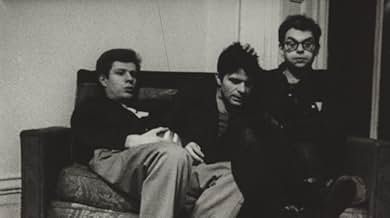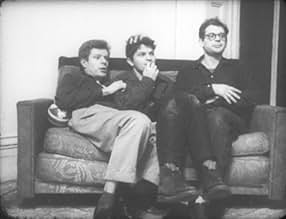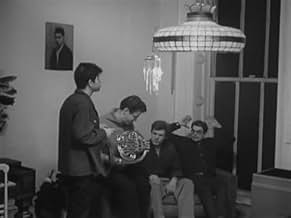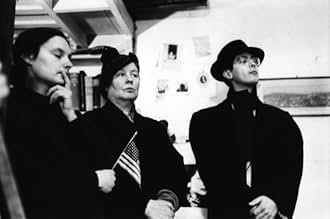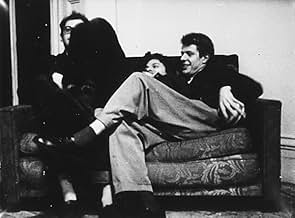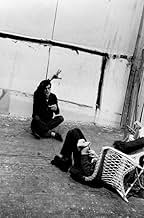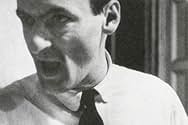Agrega una trama en tu idiomaA married couple vainly hopes that their irreverent beat poet friends will behave themselves when the bishop comes to visit.A married couple vainly hopes that their irreverent beat poet friends will behave themselves when the bishop comes to visit.A married couple vainly hopes that their irreverent beat poet friends will behave themselves when the bishop comes to visit.
- Dirección
- Guionista
- Elenco
- Premios
- 1 premio ganado en total
Allen Ginsberg
- Allen
- (as Alan Ginsberg)
Delphine Seyrig
- Milo's Wife
- (as Beltiane)
Richard Bellamy
- Bishop
- (as Mooney Pebbles)
- Dirección
- Guionista
- Todo el elenco y el equipo
- Producción, taquilla y más en IMDbPro
Opiniones destacadas
The background drama is interesting, I think, and not well known. Like Subterraneans, this story was transplanted from one coast to another.
The Cassadys lived in the scenic foothills of the Santa Cruz Mountains, and the neighborhood was gentrifying in the years they were there. Many of the cultural contrasts in Beat epics were actually suggested by the various Beats and Pranksters playing off against the ritzy neighbors in Monte Sereno. There really was a bishop and his wife visiting in the Cassady home one evening while Ginsberg and Corso were there.
Milo is a stand-in for Neal Cassady, of course, and the resentment and struggles against wife Carolyn are not made up neither. The rhythm of the commentary over the action is exceptional. I don't know where I have seen the like.
The Cassadys lived in the scenic foothills of the Santa Cruz Mountains, and the neighborhood was gentrifying in the years they were there. Many of the cultural contrasts in Beat epics were actually suggested by the various Beats and Pranksters playing off against the ritzy neighbors in Monte Sereno. There really was a bishop and his wife visiting in the Cassady home one evening while Ginsberg and Corso were there.
Milo is a stand-in for Neal Cassady, of course, and the resentment and struggles against wife Carolyn are not made up neither. The rhythm of the commentary over the action is exceptional. I don't know where I have seen the like.
8tmv9
One of the more quintessential displays of the era of Beat poetry and Bop music. Set in a NYC apartment, the movie is narrated by Jack Keoruac and portrays the life of an artistic 'family'. From painter, poet, and musician, the movie moves quickly without any particular place to go. It strikes at the heart of the movement and should be avoided by anybody who cannot stand the sometimes 'zoned' out babble of this generation. Enjoyable and short, the film fits a small genre of the American experience.
"The first truly beat film" -Jonas Mekas
It is easy to say that Pull My Daisy is the epitome of "beat generation" cinema. It can also be said that Pull My Daisy was the first film to practice the radical beliefs of "The New American Cinema Group". After all the historical and analytical nonsense is done, you are still left with a film that is passionate, personal, and most importantly- a film that entertains while expanding your understanding of art and the artist within a movement.
Pull My Daisy is based on the third act of a play written by beat generation mastermind Jack Kerouac untitled The Beat Generation (which was changed because MGM had the copyright to Beat Generation because of a low budget B-movie made by the studio in the late 50's). The new title was based on a poem written by Kerouac, poet Allen Ginsberg, and Neal Cassady in a be-bop jazz meditation (jazz and meditation- two important aspects of the film!) The film takes place in a New york apartment and never leaves the apartment except in one dream sequence. The cast of characters reads like a who's who of the beat generation: Allen Ginsberg, Gregory Curso, Peter Orvolosky (all of which retain their real names during the film). The film itself is beautifully narrated by Keroauc with a subtle be bop jazz soundtrack. The cast acts like themselves- substance abusing philosophers who sit in lotus positions contemplating life and art. The story picks up with the entrance of a bishop with his mother and sister. He is an outsider who enters this world of poets and must focus on their neo-buddhist rantings of "is baseball holy...etc.".
Where other films of "The New American Cinema" seem detached and unaccessible to the public- Pull My Daisy is an honest and almost affectionate portrait of the beat generation. This is the one film (with a possible inclusion of Cassavette's Shadows) of the movement that expands past the area of modernist-artistic riff-raff and tells a true story that is virtuous and right (yet highly symbolic and leaves the viewer questioning many aspects of life). Pull My Daisy is the shining star of the cannon of "The New American Cinema" and is a film that should forever be preserved for generations of alienated film makers and cinema fans.
It is easy to say that Pull My Daisy is the epitome of "beat generation" cinema. It can also be said that Pull My Daisy was the first film to practice the radical beliefs of "The New American Cinema Group". After all the historical and analytical nonsense is done, you are still left with a film that is passionate, personal, and most importantly- a film that entertains while expanding your understanding of art and the artist within a movement.
Pull My Daisy is based on the third act of a play written by beat generation mastermind Jack Kerouac untitled The Beat Generation (which was changed because MGM had the copyright to Beat Generation because of a low budget B-movie made by the studio in the late 50's). The new title was based on a poem written by Kerouac, poet Allen Ginsberg, and Neal Cassady in a be-bop jazz meditation (jazz and meditation- two important aspects of the film!) The film takes place in a New york apartment and never leaves the apartment except in one dream sequence. The cast of characters reads like a who's who of the beat generation: Allen Ginsberg, Gregory Curso, Peter Orvolosky (all of which retain their real names during the film). The film itself is beautifully narrated by Keroauc with a subtle be bop jazz soundtrack. The cast acts like themselves- substance abusing philosophers who sit in lotus positions contemplating life and art. The story picks up with the entrance of a bishop with his mother and sister. He is an outsider who enters this world of poets and must focus on their neo-buddhist rantings of "is baseball holy...etc.".
Where other films of "The New American Cinema" seem detached and unaccessible to the public- Pull My Daisy is an honest and almost affectionate portrait of the beat generation. This is the one film (with a possible inclusion of Cassavette's Shadows) of the movement that expands past the area of modernist-artistic riff-raff and tells a true story that is virtuous and right (yet highly symbolic and leaves the viewer questioning many aspects of life). Pull My Daisy is the shining star of the cannon of "The New American Cinema" and is a film that should forever be preserved for generations of alienated film makers and cinema fans.
A humorous almost innocent short film starring the Beat poets, alas not Kerouac but the narration which he wrote and speaks is beautiful and funny. In my innocence I was amazed to see the group passing around pot (*I know it was tobacco!) on camera. Thankfully this time capsule is available for viewing online (Open Culture) together with a clip of the poets visiting an East Side bar, filmed at the same time.
Various "Beat Generation" luminaries hang out in a New York apartment. I usually couldn't care less about the Beats, but this short film is fairly absorbing, thanks mostly to Jack Kerouac's vibrant narration. It makes me nostalgic for the '50s, and I wasn't even around back then.
¿Sabías que…?
- TriviaDebut of actress Delphine Seyrig.
- ConexionesFeatured in The Fifties (1997)
Selecciones populares
Inicia sesión para calificar y agrega a la lista de videos para obtener recomendaciones personalizadas
Detalles
- Tiempo de ejecución
- 30min
- Color
- Mezcla de sonido
Contribuir a esta página
Sugiere una edición o agrega el contenido que falta

